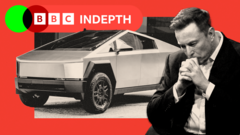As Tesla navigates a crucial period, the question remains: Can the automaker maintain its market lead under Musk's management?
**Tesla Faces Multifaceted Challenges as Musk's Leadership Sparks Backlash**

**Tesla Faces Multifaceted Challenges as Musk's Leadership Sparks Backlash**
The company's reputation and sales are suffering amidst Elon Musk’s controversial actions both politically and within the business landscape.
Tesla's association with its CEO, Elon Musk, is facing scrutiny as a growing backlash emerges concerning his actions and political involvement. One of the latest critics, Ben Kilbey, proudly showcases his three-year-old Model Y but has grown disillusioned, stating that the vehicle represents a company whose leadership lacks kindness and compassion in its dealings, particularly regarding personnel changes at a governmental level. This discontent is not limited to individuals like Kilbey; it has manifested in protests across multiple countries, including the US, UK, Canada, Germany, and Portugal.
While most protests have been peaceful, some incidents have escalated to vandalism, including the defacement of Tesla vehicles and charging stations. Social media is rife with images of Cybertrucks being sabotaged, revealing rising anti-Musk sentiments.
In stark contrast, former President Donald Trump has expressed support for Tesla, condemning violence against the company's showrooms as "domestic terrorism." Musk himself has decried such actions, arguing that Tesla merely produces electric vehicles and does not deserve these attacks.
Despite the recent popularity of the Model Y, which was the best-selling car globally last year, Tesla's overall sales saw a slight decline for the first time in over a decade, raising flags for a growth-focused company. Analysts have voiced concerns that Musk's controversial public image and political affiliations may be harming Tesla’s brand reputation, particularly in Europe and Canada.
Tesla's current model lineup, once seen as cutting-edge, is now perceived as dated compared to newcomers in the increasingly competitive electric vehicle market. Traditional manufacturers, along with Chinese brands like BYD, are releasing models that rival Tesla’s offerings in both innovation and affordability.
The company's ambitious future projects, including plans for robotaxis and autonomous systems, have yet to materialize as Musk continues to promise advancements that have not yet been realized, leading some experts to question his focus and commitment to Tesla. As Musk juggles multiple significant business ventures, including SpaceX and the social media platform X, calls for new leadership are growing more pronounced among stakeholders.
With analysts believing the time is ripe for a significant leadership change at Tesla, there is a palpable sense of urgency to pivot direction and ameliorate the brand's image. As the automotive landscape shifts and shareholder expectations evolve, the pressure on Musk to deliver transformative results has never been greater.
While most protests have been peaceful, some incidents have escalated to vandalism, including the defacement of Tesla vehicles and charging stations. Social media is rife with images of Cybertrucks being sabotaged, revealing rising anti-Musk sentiments.
In stark contrast, former President Donald Trump has expressed support for Tesla, condemning violence against the company's showrooms as "domestic terrorism." Musk himself has decried such actions, arguing that Tesla merely produces electric vehicles and does not deserve these attacks.
Despite the recent popularity of the Model Y, which was the best-selling car globally last year, Tesla's overall sales saw a slight decline for the first time in over a decade, raising flags for a growth-focused company. Analysts have voiced concerns that Musk's controversial public image and political affiliations may be harming Tesla’s brand reputation, particularly in Europe and Canada.
Tesla's current model lineup, once seen as cutting-edge, is now perceived as dated compared to newcomers in the increasingly competitive electric vehicle market. Traditional manufacturers, along with Chinese brands like BYD, are releasing models that rival Tesla’s offerings in both innovation and affordability.
The company's ambitious future projects, including plans for robotaxis and autonomous systems, have yet to materialize as Musk continues to promise advancements that have not yet been realized, leading some experts to question his focus and commitment to Tesla. As Musk juggles multiple significant business ventures, including SpaceX and the social media platform X, calls for new leadership are growing more pronounced among stakeholders.
With analysts believing the time is ripe for a significant leadership change at Tesla, there is a palpable sense of urgency to pivot direction and ameliorate the brand's image. As the automotive landscape shifts and shareholder expectations evolve, the pressure on Musk to deliver transformative results has never been greater.




















